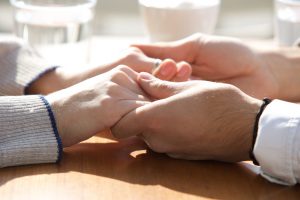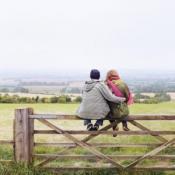 Although trauma-informed therapy is gaining in popularity, one crucial component is often missing from the conversation—the importance of healing from a perceived lack of relational safety that often accompanies posttraumatic stress (PTSD).
Although trauma-informed therapy is gaining in popularity, one crucial component is often missing from the conversation—the importance of healing from a perceived lack of relational safety that often accompanies posttraumatic stress (PTSD).
If you have experienced a life-altering traumatic situation, you may understand all too well the more commonly discussed symptoms of PTSD:
- Re-experiencing symptoms such as flashbacks and nightmares
- Avoiding people or situations that trigger memories of the event, which may include dissociation/numbing as well as external avoidance behaviors
- Negative feelings and beliefs, or a lack of perceived safety or okay-ness
- Hyperarousal such as insomnia, startling easily, or a persistent “fight-or-flight” feeling of tension in the body
While you may experience some or all of these symptoms as a trauma survivor, they paint only a part of the picture. Taken together, these symptoms often have an unfortunate effect of causing a person experiencing PTSD to distrust themselves and the world around them; to isolate by numbing or avoiding discussing their thoughts or experiences with others; and to feel unsafe in their body due to the hyperarousal symptoms. Healing from PTSD requires connection to friends, family, and community, support from others who have experienced similar symptoms, and a strong therapeutic connection with a therapist who understands how to help heal trauma symptoms. These relationships help restore both a belief and a felt sense that the world can be safe. Yet, paradoxically, PTSD causes those very connections to feel dangerous and threatening rather than potentially healing.
The first step to healing from trauma is recognizing the ways in which symptoms may cause you to want to isolate from others, whether loved ones or support groups or a therapist. This recognition is important, as it will be necessary when pacifying any fear, anxiety, or panicked feelings you may experience while interacting with others. These feelings are natural and understandable in the context of understanding trauma can cause a lack of trust in the world and in others. This can be even truer if the trauma was a result of harm caused by others rather than a natural disaster or events not directly related to a human cause.
Once you have noticed and recognized these isolating behaviors as being an effect of having experienced a traumatic event, you have the choice to deliberately make decisions and take actions that could lead to connection and trust.
While post-trauma survival instincts may cause you to feel most comfortable trusting only yourself, to isolate from others, or to turn to coping behaviors such as drinking or working long hours, these behaviors may prevent you from reestablishing connection and trust in the world and yourself—vital for healing from the effects of trauma and living a satisfying life. The effects of isolation can be even greater if you are living with the symptoms of PTSD caused by traumatic occurrences in childhood, in which case you may never have had the chance to build or experience deep, loving relationships or trust in the world around you.
Once you have noticed and recognized these isolating behaviors as being an effect of having experienced a traumatic event, you have the choice to deliberately make decisions and take actions that could lead to connection and trust. This may feel frightening or difficult, and you may find yourself having thoughts about other people being unsafe, untrustworthy, or not worth the effort. It is important to take small steps that may be counterintuitive to what your survival-based instincts are telling you, and then stop to reassess to see if your perceptions were true or not.
Two of the best places to experience safety and healing within a relationship are in therapy with a safe and understanding therapist, and in therapeutic or support group settings with others who understand your experiences.
- Individual psychotherapy: You will have the chance to experience a relationship that is safe, nurturing, and healing. You can expect an experienced trauma therapist to work with you in a way that helps you recover without experiencing additional pain or retraumatization as a result of the therapy. In addition, a therapist can serve as a witness to stories you need to tell and emotions you want to share, and can help guide you through the process of owning your experience or making meaning of why bad things happen.
- Group therapy and support groups: Groups can help you meet peers who may have experienced similar situations or symptoms, which can give you a chance to both talk to and hear from others who share similar struggles and triumphs. This can help you feel less alone in your experiences. In a group setting, you may learn valuable problem-solving ideas and skills. Support groups are often run for and by people who have similar experiences, while group therapy run by one or more mental health professional may involve directed therapeutic and relational interventions.
If you are living with symptoms of PTSD, it is possible to recover and feel better. With courage, patience, and the help of experienced professionals and caring peers, you can rediscover the strength within to live a satisfying and meaningful life.

The preceding article was solely written by the author named above. Any views and opinions expressed are not necessarily shared by GoodTherapy.org. Questions or concerns about the preceding article can be directed to the author or posted as a comment below.

 10 Steps to Recovering from a Toxic Trauma Bond
10 Steps to Recovering from a Toxic Trauma Bond Felt Sense: The Vitality and Liveliness of Our Inner World
Felt Sense: The Vitality and Liveliness of Our Inner World How to Help Someone with Posttraumatic Stress (PTSD)
How to Help Someone with Posttraumatic Stress (PTSD)

Please fill out all required fields to submit your message.
Invalid Email Address.
Please confirm that you are human.
Leave a Comment
By commenting you acknowledge acceptance of GoodTherapy.org's Terms and Conditions of Use.